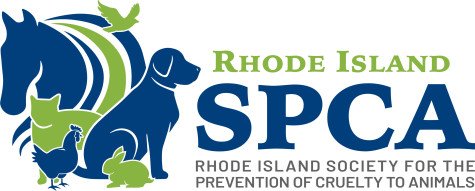Frequently Asked Questions
Find answers to our most frequently asked questions below!
-
No. The Rhode Island SPCA was established by an act of the Rhode Island legislature in 1870 and is not affiliated with the ASPCA or any other “SPCA”. Donations to the ASPCA do not benefit the Rhode Island SPCA.
-
Since 1870 ~ 154 years and counting.
-
The Rhode Island SPCA provides adoption and rehoming services, veterinary care, humane education, training support and pet owner assistance programs. It also has an active law enforcement division and is the only humane organization in Rhode Island authorized to investigate and prosecute cases of animal cruelty and neglect. In addition, the Rhode Island SPCA actively promotes legislative initiatives aimed at improving the welfare of all animals in our state.
-
The Rhode Island SPCA works with all domestic animals. At any given time, you can find dogs, cats, and small animals including rabbits and guinea pigs at our shelter. With the help of our established foster care network, we also work with large animals including horses, ponies, donkeys, goats, sheep, pigs on a regular basis.
-
We accept and place over 1,200 animals each year. The majority of the animals we work with are animals that have been surrendered by their owners, many of which have not been accepted for surrender at other shelters before coming to us.
-
Our animal health center opened in mid-2021 and has been working at capacity since the moment it started providing services. We see and treat an average of 264 unique patients each month (approximately 3,150 unique patients each year) and we expect that number will increase dramatically when we open our new facility in Warwick.
-
There are several humane animal organizations doing great work in Rhode Island but we are the only private organization that is actively involved in animal cruelty law enforcement and is available to respond to domestic animals in distress. We are also unique because we accept several hundred pets each year due to owner surrenders, many of which have previously been rejected by other shelters and we successfully place nearly all of those surrendered animals into new homes. Many of our programs, particularly the Marvin Fund, our hardship boarding program, our low-cost veterinary clinic, our food pantry and our educational programs benefit both the animals we serve and their humans.
-
We fit all of the accepted definitions of a “no kill” shelter because we never euthanize an animal due to time or space and because we successfully place nearly all of the animals that come into our custody into new homes. However, we believe the term “no kill” is misleading and we don’t use it in our public materials. We believe that euthanasia is an acceptable response when it is necessary to alleviate an animal’s suffering due to serious disease, injury or infirmity and in those instances where an animal poses a significant safety threat that we are unable to address. We never euthanize an adoptable animal and train, socialize and provide medical treatment so that animals in our care become adoptable.
-
We post all of our adoptable animals on our website. If you see a potential new best friend, we suggest you complete an online application. Once approved, one of our animal care staff will contact you to schedule a meet and greet with the animal. Cats and kittens are adopted quickly once they are posted on our website. We encourage you to stop by the shelter during our public hours to see what is available, particularly if you are interested in adopting a cat or a small animal. We cannot guarantee that an “on the spot” adoption will happen but we do our best to accommodate all potential adopters.
-
Unfortunately, you are not alone and because of that there is often a wait list for pet surrenders. If you need to surrender your pet, please call the shelter first. We will ask you to complete a surrender form and when space is available we will contact you to come in with your pet. If your surrender request is due to an emergency or hardship situation, inquire about our hardship boarding program.
-
It costs a great deal of money to shelter, feed and take care of the animals. All of our animals are seen by a veterinarian when they come to us and many of them require veterinary care and/or socialization before they can be adopted. Our adoption fee includes an exam, microchip, spaying or neutering, vaccinations, deworming, flea and tick preventatives, and any necessary medications. On average, our adoption fees cover less than 25% of the combined cost of the medical expenses and care that we incur caring for animals that are awaiting placement.
-
The Rhode Island SPCA is a private nonprofit organization with 501(c) (3) status. Fees collected for adoptions and for veterinary services cover less than one third of the operating costs of the Society and the Society relies on donations from individuals, grants from charitable foundations; and by funds raised from special events to support is operations and does not accept governmental funding. Bequests help to ensure the ongoing financial stability of the RISPCA and, as with all gifts, are greatly appreciated. As a non‑profit, charitable organization, all donations to the Rhode Island SPCA are tax deductible to the extent allowed by law. The Society’s financial records are independently audited each year.

